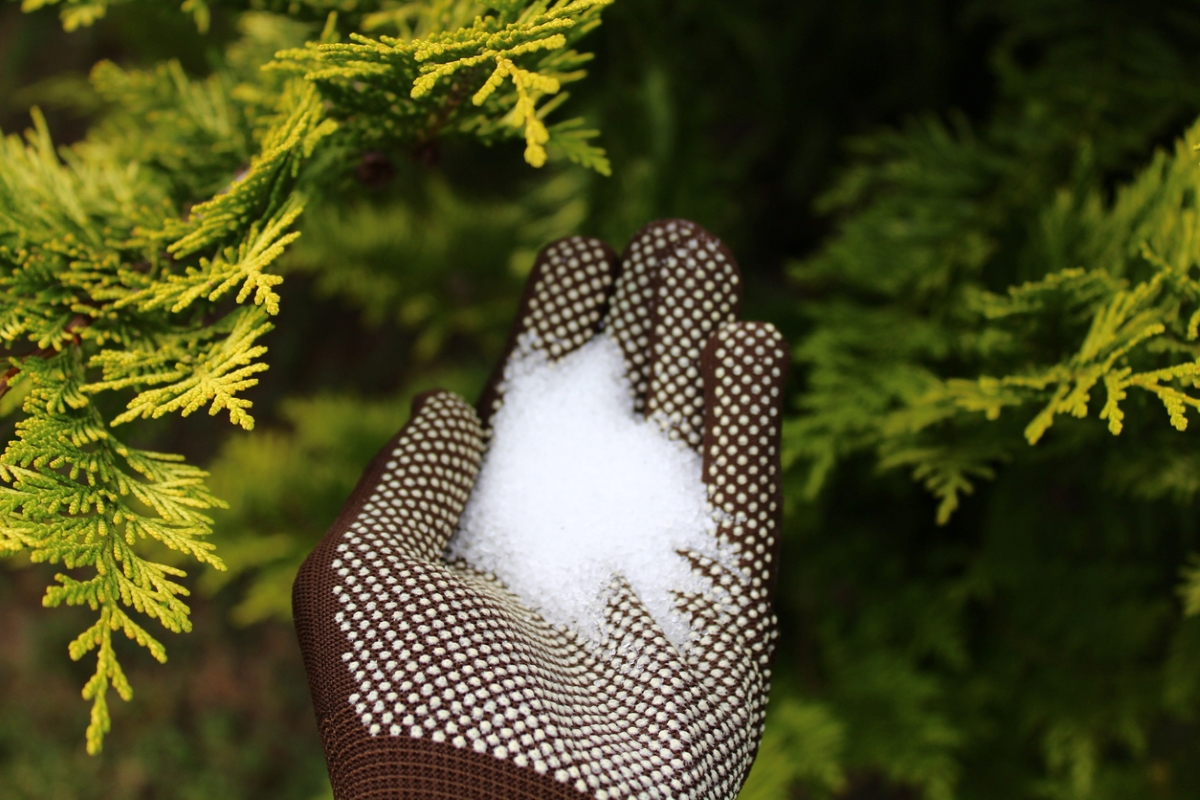

We may earn revenue from the products available on this page and participate in affiliate programs. Learn More ›
Epsom salt, which was named for the town near London in which it was discovered, is a natural mineral compound. The compound it contains—magnesium sulfate—is not present in typical table salt, and Epsom salt is not used for flavoring or eating. It does, however, break down easily in water, and soaking in Epsom salt dissolved in warm water has long been touted as a way to relieve muscle pain.
Is Epsom salt good for plants?
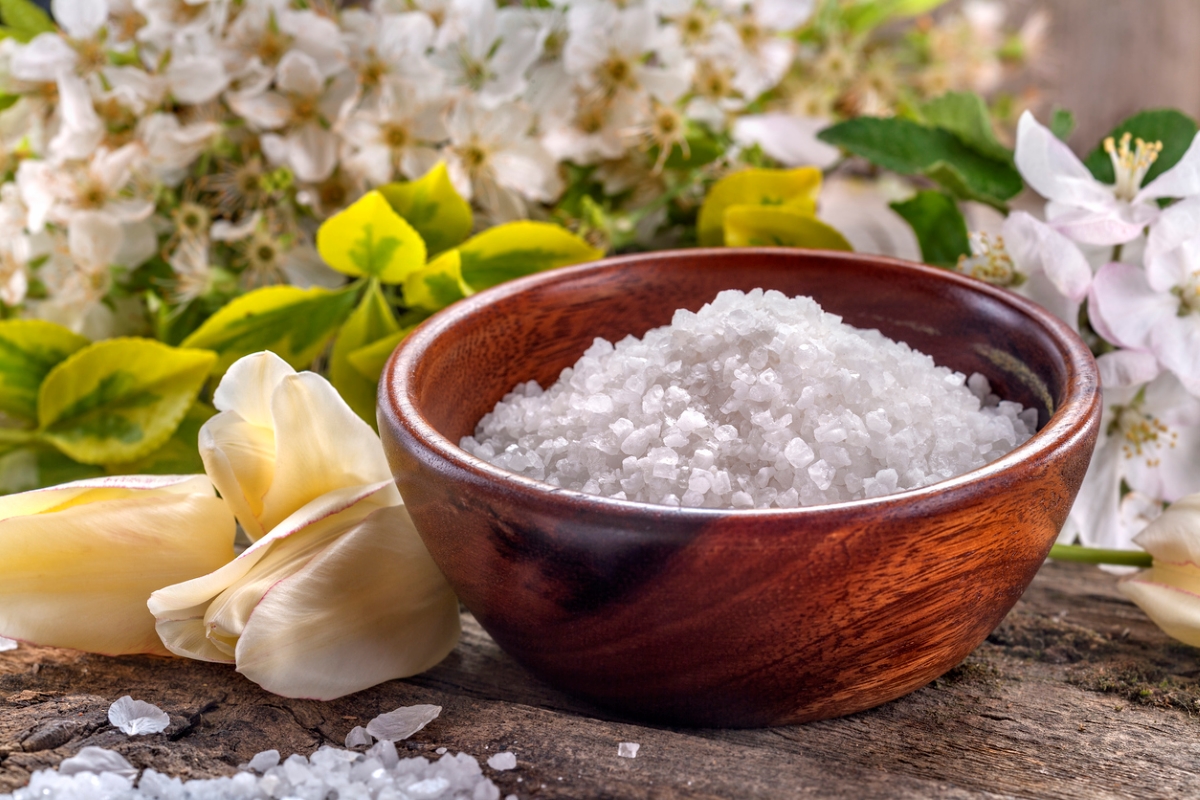
Epsom salt has a place in the garden, but a more limited one than social media posts might have you believe. Its relatively high levels of magnesium and sulfur are among the essential elements that plants need, contributing to growth and flowering or fruiting. Both elements aid in photosynthesis and help plants absorb the three primary macronutrients (nitrogen, phosphorus, and potassium). But plants don’t need magnesium and sulfur in large amounts; most healthy soils provide them without additives.
What does Epsom salt do for plants?
In large crop-growing or timber-harvesting operations around the world, magnesium deficiencies can occur. As a result, farmers engaged in intensive crop or conifer production may use Epsom salt to improve production.
If your garden soil is known to be deficient in magnesium, adding Epsom salt can be a good idea. Epsom salt is not, strictly speaking, a fertilizer or plant food, though. It contains some elements that plants need, but not all of them. Still, when used correctly, there are some ways in which Epsom salt can enhance the growth and health of plants.
How to Use Epsom Salt in the Garden
A first step in Epsom salt garden use is to check with your county extension office to learn about soil makeup in your area and to find soil testing resources. It’s always a good idea to test your soil before adding Epsom salt, garden lime, or other amendments aside from compost. It’s also wise to research any touted use for Epsom salt in the garden to find out whether it’s proven effective, and how much Epsom salt for plants to apply to reap a benefit. In general, Epsom salt works best when diluted.
Proceed carefully. Adding the chemical to soil that already has sufficient magnesium can harm both plants and soil, and spraying it on plant leaves can cause leaf scorch. And excess use in soil outdoors can increase mineral contamination of groundwater.
Boost Soil’s Magnesium Levels
Most soil (especially loamy soil) will provide enough magnesium, sulfur, and other nutrients if you regularly add some organic compost each year. If your soil already contains plenty of magnesium, it’s likely that plants will be fine without adding Epsom salt.
If your soil is sandy or highly acidic (with a pH level below 6.0), it is more likely to have a magnesium deficiency. But the only way to truly know is to do a soil test. If soil lacks magnesium, you can use Epsom salt to boost it, but don’t expect it to be the end-all solution for low levels of magnesium or other elements in your soil.
Enhance Vegetable Growth
Magnesium sulfate can increase plants’ uptake of key nutrients, including nitrogen and phosphorus, and garden tests have borne out some of these benefits. In one small-scale study, testers in five states gave pepper plants a foliar spray of 1 tablespoon Epsom salt to 1 gallon of water when peppers and roses bloomed, and again 10 days later. Four of the six testers reported that the treated pepper plants showed thicker foliage and larger fruits. Testers also reported greener foliage and more roses on the treated rose plants.
Remedy Yellowing Leaves
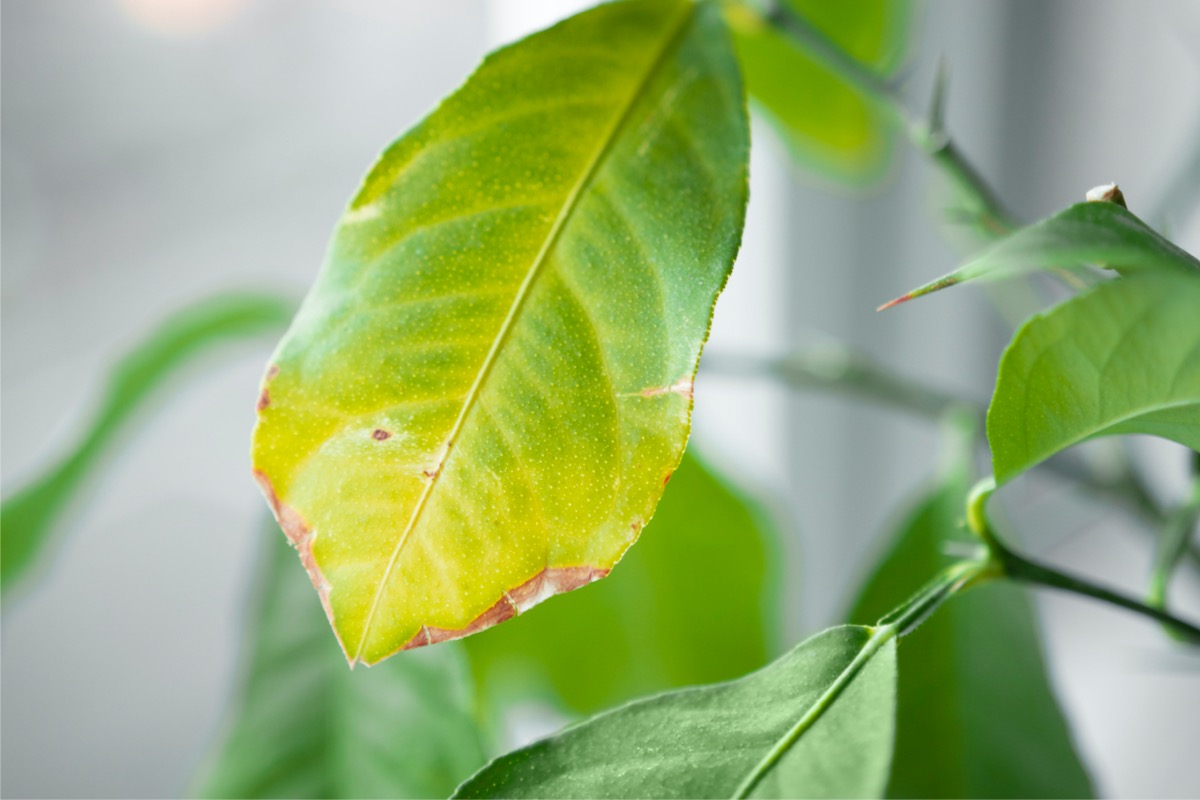
Mineral deficiencies can interfere with photosynthesis, leaching green color from leaves and interfering with nutrient absorption. Mature foliage that is turning yellow between the veins may indicate a magnesium deficiency, while yellowing leaves all over a plant may be an indication of a sulfur deficiency.
Some sources suggest applying a foliar spray of 1 tablespoon of Epsom salt mixed with 4 cups of water for each foot of plant height. Magnesium absorbs well when applied directly to the leaves. Be sure to dilute the spray as described above and apply it on cooler or cloudier days, about every 2 weeks.
Boost Lawn Growth
If your soil tests positive for magnesium deficiency, Epsom salt might help make your lawn more lush. The Epsom Salt Council recommends applying 3 pounds of salt for every 1,250 square feet of lawn with a spreader, or dilute Epsom salt with water and apply it with a hose or sprinkler system.
While this can be a quick fix for turf, it’s not a long-term management strategy; Epsom salt is not a fertilizer. In addition, the magnesium in Epsom salt is highly soluble and can leach out or run off of lawns into the water supply, contributing to water pollution and escaping the soil it’s meant to improve.
Support Rose Production
Although there is no scientific evidence that using Epsom salt for roses improves flowering of these or other shrubs, some rose growers claim it helps make foliage darker green and increases new cane production. Rose growers suggest applying about ½ cup of Espom salt granules in spring before the first buds open and again in fall before the leaves drop off. Be sure to dilute the granules by watering slowly and deeply.
Rose enthusiasts might also add a tablespoon of Epsom salt for every gallon of water to spray foliage when roses leaf out and again during flowering. The magnesium in Epsom salt should be seen only as a supplement to a slow-release rose fertilizer containing nitrogen, potassium, and phosphorus.
Dry Out Tree Stumps
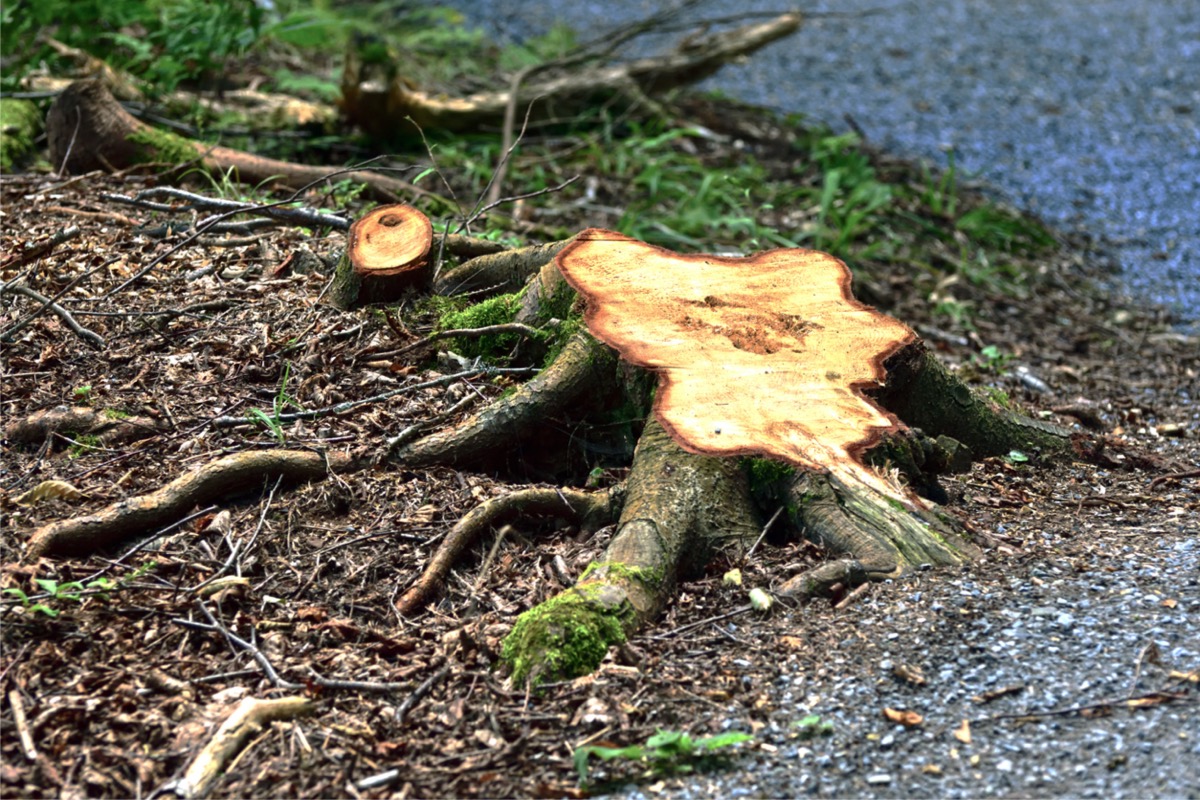
Some homeowners turn to a DIY means of killing a tree stump by enlisting Epsom salt to speed the process. Although it takes time to completely kill a stump, using a high quantity of Epsom salt dries up the root system. (Note that this can be fatal to nearby plants, so use carefully.) Professional stump removal services can cost between $160 and $500, depending on the size of the trunk, so this might be worth a try; some tree care companies mention this technique as a DIY stump removal method.
Get started by boring holes all around the top of the stump with a drill, using a ½-inch drill bit. The holes should be about half the depth of the stump and spaced a few inches apart. Then, pour Epsom salt granules into the holes and slowly add water to moisten, but not saturate, the salt. Cover the stump with a tarp to repel rain and speed up the drying.
You might have to repeat this process several times. As the wood dries, it becomes easier to chip away at the stump with an axe. Eventually, you will be able to dig up and dispose of the remaining root system.
How to Mix Epsom Salt for Plants
If testing indicates that your garden soil or plants could benefit from Epsom salt, the key is to dilute the salt sufficiently to avoid damaging plants or contaminating groundwater. Because the compound is so water soluble, it is available to a plant’s root zone for a brief time only. However, frequent application is not advisable because a particular soil’s ability to retain the nutrients varies widely.
- For foliar sprays of Epsom salt, typically mix 1 tablespoon of salt per 1 gallon of water.
- For soil applications, sprinkle no more than ½ cup of granules at the base of a plant; work it into the ground lightly and add a slow drip of water to help dissolve the granules.
- When starting a garden, consider sprinkling 1 cup of Epsom salt per 100 square feet of soil before planting; mix it in with other amendments and water.
- For turf or pasture, use no more than 3 pounds of salt for every 1,250 square feet of lawn, apply with a spreader and then water, or dilute Epsom salt with water and apply with a sprayer.
Myths About Using Epsom Salt in the Garden
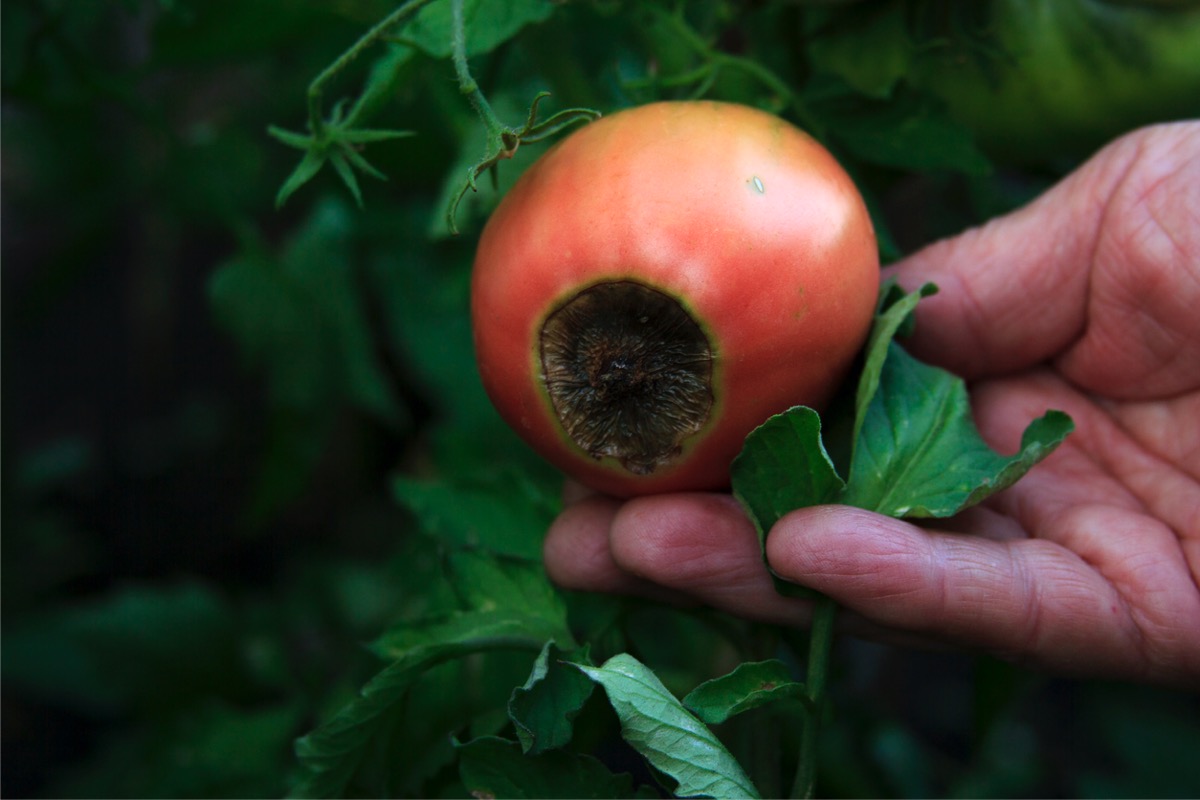
Although social media and some internet sources offer plenty of claims about the benefits of Epsom salt in the garden, horticultural experts downplay the practice. Here are just a few of the largely debunked myths about using Epsom salt in the garden.
- Prevents blossom end rot in tomatoes. This myth is unfounded. Blossom end rot is a calcium deficiency, and its cause usually has to do with watering problems. In fact, increasing the amount of magnesium might make matters worse by competing with the calcium in the soil. Instead of using Epsom salt for tomato plant growth, give tomatoes consistent moisture through a soaker hose or other slow drip method.
- Helps seeds germinate. Applying Epsom salt might temporarily boost magnesium, but the truth is that most seeds can germinate without additives, especially when sowed in quality seed starting mixes.
- Increases vegetable yield and improves flavor. Sweet peppers and tomatoes are said to benefit from adding Epsom salt to the soil of each hole at planting time. The reports on which this claim is based are more than 60 years old and focused on intensive tomato production. The average home gardener does not need to use Epsom salt for tomatoes, and overusing the product could contaminate the soil or harm plants.
- Enhances houseplants. Although Epsom salt is pH neutral and gentle on plants, including potted houseplants, it is not a fertilizer. While Epsom salt can replace some lost magnesium, houseplants will benefit more from regular application of a balanced organic fertilizer and the use of fresh potting mix to restore nutrients and improve soil health. With potted plants, another concern is that Epsom salt added to the soil has nowhere to go and can build up.
- Keeps ferns healthy. A recent trend involves drenching ferns in a solution of water and Epsom salt. There is no scientific evidence that adding this chemical compound benefits ferns any more than providing good care, such as well-draining soil, humidity, regular watering, space, and sufficient indirect light.
- Deters pests. There is no scientific research to support claims that using Epsom salt on trees or other plants can deter pests and diseases. As well, spraying Epsom salt on foliage in hot sun or in too high an amount can cause leaf scorch.
- Can never harm plants or soil. Although Epsom salt is highly soluble, any nutrient used in excess or where it’s not needed can persist in soil and compete with other nutrients that roots need to take up and distribute to the plant. And as mentioned above, Epsom salt can wash away with water runoff and contaminate waterways.
Final Thoughts
You won’t find a reliable list of what plants don’t like Epsom salt and which plants do. In fact, adding Epsom salt to plants or soil simply is not necessary unless the level of magnesium in the soil is very low.
If it turns out that your soil or plants would benefit from treatment with Epsom salt, be sure you’re applying it (or any soil additive or fertilizer) in a way that will do the least harm to plants and the environment. But overall, the best strategy for keeping your plants healthy and well fed is to add organic compost to the soil each year, use slow-release fertilizers as recommended, and water consistently.
About the Author
Teresa Odle is an editor in the life sciences and garden blog founder who was trained as a master gardener in Albuquerque, New Mexico. She has gardened in the deserts and mountains of the Southwestern state for more than 20 years.
